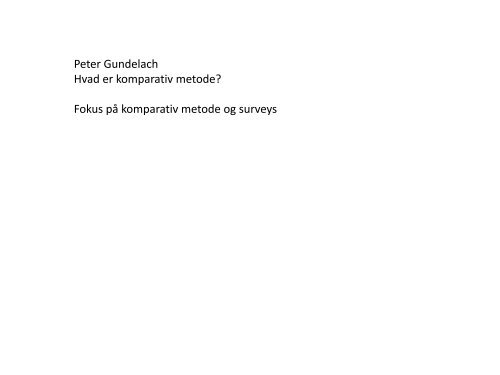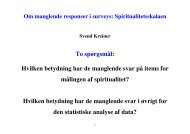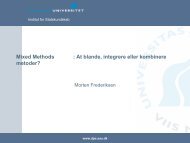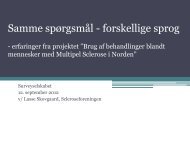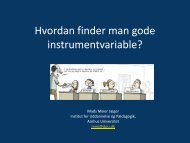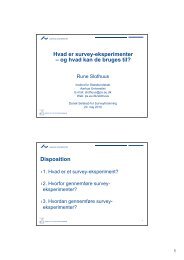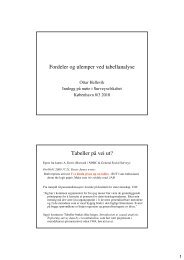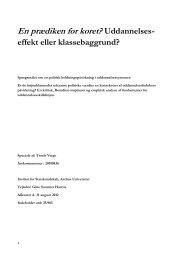Peter Gundelach Hvad er komparativ metode? Fokus på komparativ ...
Peter Gundelach Hvad er komparativ metode? Fokus på komparativ ...
Peter Gundelach Hvad er komparativ metode? Fokus på komparativ ...
You also want an ePaper? Increase the reach of your titles
YUMPU automatically turns print PDFs into web optimized ePapers that Google loves.
<strong>Pet<strong>er</strong></strong> <strong>Gundelach</strong><br />
<strong>Hvad</strong> <strong>er</strong> <strong>komparativ</strong> <strong>metode</strong>?<br />
<strong>Fokus</strong> <strong>på</strong> <strong>komparativ</strong> <strong>metode</strong> og surveys
Komparativ <strong>metode</strong><br />
<strong>Hvad</strong> <strong>er</strong> det?<br />
Sammenligning<strong>er</strong> <strong>på</strong> systemniveau<br />
(lande,organisation<strong>er</strong>,lokalsamfund etc. )<br />
Hvorfor skal man gøre det?<br />
For at undgå at ov<strong>er</strong>se betydningen af konteksten.<br />
For at stimul<strong>er</strong>e nye indsigt<strong>er</strong> (den fremmedes p<strong>er</strong>spektiv).<br />
For at undgå at lave fejl ved at kun at sige noget om en<br />
delmængde.<br />
Hvilke mulighed<strong>er</strong> har man for at gøre det?<br />
Kræv<strong>er</strong> data <strong>på</strong> tværs af system<strong>er</strong> fx spørgeskemaund<strong>er</strong>søgels<strong>er</strong><br />
I mange lande (fx EVS, ESS, ISSP, HBSC og mange andre)
To typ<strong>er</strong> design<br />
Most similar<br />
Most diff<strong>er</strong>ent
Most similar : Ens <strong>på</strong> de fleste variable, men forskelligt udfald<br />
Formål: specifikation<br />
System 1 System 2<br />
Variabel 1 A A<br />
Variabel 2 B B<br />
Variabel 3 C C<br />
Forklarende<br />
variabel<br />
Afhængig<br />
variabel<br />
X Z<br />
Y Ikke Y<br />
Eksempel: alkoholbrug i Danmark og Sv<strong>er</strong>ige
Most diff<strong>er</strong>ent:<br />
Formål: gen<strong>er</strong>alis<strong>er</strong>ing,<br />
samme variable i alle system<strong>er</strong><br />
Var 1<br />
(uafhængig)<br />
Var 2<br />
(afhængig)<br />
System 1 System 2 System n<br />
A A A A<br />
B B B B<br />
Eksempel: Sammenhæng mellem uddannelsesniveau og tol<strong>er</strong>ance
Øst- og Vesttyskland, Most similar:<br />
Er det i orden at unddrage sig skat (WVS). Østtysk<strong>er</strong>ne mest moralske<br />
Høj (kan ikke billige at man<br />
snyd<strong>er</strong>)<br />
Feld, Lars P., Torgl<strong>er</strong>, Benno (2007) Tax Morale aft<strong>er</strong> the Reunification of G<strong>er</strong>many:<br />
Results from a Quasi-Natural Exp<strong>er</strong>iment
Forskellen mellem Øst- og Vesttyskland udjævn<strong>er</strong> sig
Most diff<strong>er</strong>ent: samme tendens i alle lande
70%<br />
60%<br />
50%<br />
40%<br />
30%<br />
20%<br />
10%<br />
0%<br />
Most diff<strong>er</strong>ent. Frihed vs. lighed som politisk mål. Samme resultat i alle<br />
lande:<br />
Andel lighed ov<strong>er</strong> frihed<br />
Rød = kvinde, blå = mand<br />
1 2 3 4 5 6 7 8 9 10 11 12 13 14 15 16 17 18 19 20 21 22 23 24 25 26 27 28 29 30 31 32 33 34 35 36 37 38 39 40 41 42 43 44 45 46<br />
Kvind<strong>er</strong> foretrækk<strong>er</strong> frihed frem for lighed m<strong>er</strong>e end mænd.<br />
Lande
Søge eft<strong>er</strong> årsagssammenhæng mellem to landevariable:<br />
Ulighed (mål ved Gini-indeks og priorit<strong>er</strong>ing af lighed)
65%<br />
60%<br />
55%<br />
50%<br />
45%<br />
40%<br />
35%<br />
30%<br />
25%<br />
Ingen sammenhæng mellem valg af lighed og<br />
Gini-koefficient<br />
Lighed frem for frihed<br />
Pct.<br />
Iceland<br />
France<br />
Belgium<br />
Italy<br />
Malta<br />
Czech<br />
S<strong>er</strong>bia<br />
Hungary<br />
Croatia<br />
Switz<strong>er</strong>land<br />
G<strong>er</strong>many<br />
Latvia<br />
Luxembourg<br />
Ukraine<br />
Spain Russian<br />
Cyprus<br />
Ireland<br />
Austria<br />
Greece<br />
Noth<strong>er</strong>n Ireland<br />
Finland<br />
Armenia Moldavia<br />
Slovakia<br />
Sweden<br />
Norway<br />
Denmark<br />
Slovenia<br />
Estonia<br />
Neth<strong>er</strong>lands<br />
Poland<br />
Albania<br />
Bulgaria Romania United Kingdom<br />
Kosovo<br />
Belarus<br />
Bosnia<br />
Lithuania<br />
Montenegro<br />
Portugal<br />
Macedonia<br />
Turkey<br />
North<strong>er</strong>n Cyprus<br />
20%<br />
20 25 30 35 40 45<br />
Gini
Niveau for lykke i et land og landets rigdom (målt ved BNP)
Most diff<strong>er</strong>ent design<br />
Kurvelineær sammenhæng<br />
mellem rigdom og lykke<br />
kilde: Inglehart/Klingemann 2000
Ingleharts klassifikation af v<strong>er</strong>dens lande bas<strong>er</strong>et <strong>på</strong> to<br />
værdidimension<strong>er</strong> (tryghed /lykke og traditionel (traditionel religiøs<br />
vs sekulær)<br />
www.worldvaluessurvey.org
Gen<strong>er</strong>elle problem<strong>er</strong> i forbindelse med <strong>komparativ</strong>e metod<strong>er</strong> (1)<br />
Makroteori<strong>er</strong> <strong>er</strong> ofte så gen<strong>er</strong>elle at de <strong>er</strong> svære at teste<br />
Galtons problem (manglende uafhængighed)<br />
Valg af variable (fravalgte variable må ikke <strong>på</strong>virke analysen)<br />
Hvordan find<strong>er</strong> man relevante variable? Aggreg<strong>er</strong>ede variable<br />
bas<strong>er</strong>et <strong>på</strong> spørgeskema<strong>er</strong> kan være upræcise.<br />
ved most similar (man kan aldrig finde to ens system<strong>er</strong>). Inklud<strong>er</strong><br />
et ikke ens land for at tjekke enshed i de valgte system<strong>er</strong><br />
Valg af enhed<strong>er</strong> (bekvemmelighed, turisme og ikke faglige<br />
ov<strong>er</strong>vejels<strong>er</strong> styr<strong>er</strong> dataindsamling)<br />
Teoretiske problem<strong>er</strong>: <strong>er</strong> d<strong>er</strong> tværgående kendetegn ved<br />
system<strong>er</strong>ne (nogle forskelle <strong>er</strong> stærkt styret af staten, andre kun i<br />
begrænset omfang fx religion, familieform)
Gen<strong>er</strong>elle problem<strong>er</strong> i forbindelse med <strong>komparativ</strong>e metod<strong>er</strong> (2)<br />
Forskelle i individvariable kan forklare landeforskelle<br />
Dataindsamling (ens teknikk<strong>er</strong> kan være svære at opnå,<br />
nogle lande kan have problematisk dataindsamling)<br />
Variation<strong>er</strong> i spørgsmålsformul<strong>er</strong>ing, begrebsdannelse,<br />
osv. kan vari<strong>er</strong>e<br />
Statistiske teknikk<strong>er</strong> kan være svære at anvende, hvis d<strong>er</strong><br />
<strong>er</strong> få lande
Men<br />
Det <strong>er</strong> stimul<strong>er</strong>ende og udfordrende at arbejde med<br />
<strong>komparativ</strong>e analys<strong>er</strong><br />
Det gør en mindre etnocentrisk<br />
Det åbn<strong>er</strong> for utallige spændende forskningside<strong>er</strong> og mulighed<strong>er</strong>
D<strong>er</strong> <strong>er</strong> mass<strong>er</strong> af <strong>komparativ</strong>e datamat<strong>er</strong>ial<strong>er</strong> d<strong>er</strong>ude i databank<strong>er</strong>ne<br />
Prøv dem


